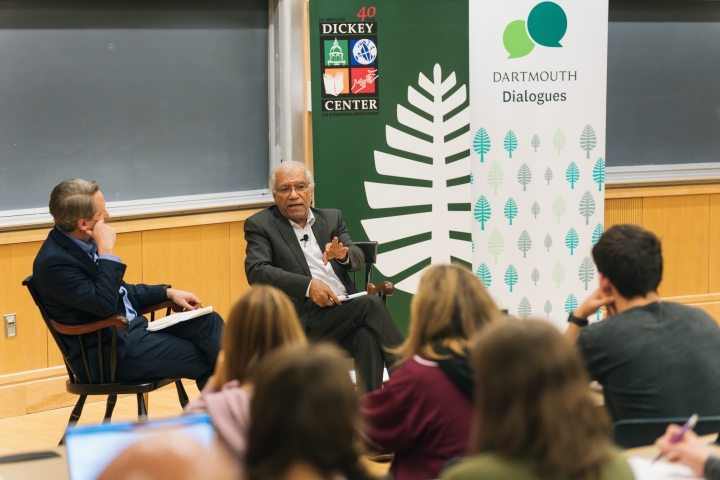In the year since the Oct. 7, 2023, Hamas attacks in Israel that killed more than 1,200 people and took 254 hostage, one of the salient questions is how much support Hamas maintains among Palestinians in the Gaza Strip and the West Bank.
Polling in the nearly 13 months since has shown that while Hamas still commands strong allegiance in the West Bank, support has gradually eroded in Gaza, Khalil Shikaki, the director of the Palestinian Center for Policy and Survey Research, said at a Dartmouth talk Wednesday evening.
With more than 40,000 dead in Gaza as a result of Israel’s air and ground war to eradicate Hamas, public opinion there is starting to shift. One of the questions that pollsters have asked respondents in Gaza is whether the Oct. 7 attacks have “advanced the interest of the Palestinian people? The answer by 70% is, no, it does not. It has been bad for the Palestinian people,” Shikaki told an audience of more than 100 in Haldeman Hall, with 200 people watching via livestream.
The event was co-sponsored by the Middle East Initiative at the John Sloan Dickey Center for International Understanding and Dartmouth Dialogues and moderated by Professor of Government Benjamin Valentino.
Shikak is also a senior fellow at the Crown Center for Middle East Studies at Brandeis University. Since 1993, he has conducted more than 200 polls among Palestinians in the West Bank and the Gaza Strip and, since 2000, dozens of joint polls among Palestinians and Israelis.
The Palestinian Center for Policy and Survey Research, which is located in the West Bank city of Ramallah, employs 75 data collectors. No surveys are done by phone because of the fear that the conversations are being monitored.
“We remain a nondemocratic society and a nondemocratic political system at that. So the difficulty here is: how do you convince people to talk to you when they might worry that you are a spy for somebody?” Shikaki said. With training, he said, data collectors are able to persuade respondents to speak frankly; but the center will not ask them any “questions that might put them at risk.”
The challenges are numerous, given that thousands of Palestinians in both Gaza and the West Bank have lost their homes to air strikes by the Israel Defense Forces and have had to relocate numerous times. The Israelis also currently forbid data collectors from going into the northern part of the Gaza strip, Shikaki said.
The populations in the West Bank and Gaza confront different obstacles and have disparate views on how to achieve a stable peace. In the West Bank, the population has lost faith in the Palestinian Authority to provide and govern without corruption; in Gaza they have faced, over the decades, blockade and siege, Shikaki said.
Surveys have also found that where there is more poverty, the greater the religiosity—and the more support for Hamas, Shikaki added.
The one word that both Palestinians and Israeli Jews use consistently to describe what has happened to each of their people in the current war is “genocide,” Shikaki said.

Polling over the years has also found that when Israelis and Palestinians are offered various options that might lead to a two-state solution, or when there seems to be progress, they express more interest in diplomacy and negotiation. There can be nuance within what seem to be even the most hardened positions.
If the thinking of Palestinians before Oct. 7 was that the only way to end the Israeli occupation was to force the Israelis toward a settlement through violence, then the thinking in the past three months in Gaza has evolved, Shikaki said.
But Palestinians are not optimistic about the present Israeli government’s view of a negotiated two-state solution.
“As long as there is no pain or suffering on the Israeli side, like the pain or suffering on the Palestinian side, Israelis are not going to be willing to make any concessions to the Palestinians. Why end the occupation, if the occupation is not costing you much?” Shikaki said.
After the talk, students said they valued the opportunity to hear Shikaki’s perspective.
“It’s a good initiative to bring in more Palestinian voices,” said Evan McMahon ’25.
Shahzeb Tayyab ’27 said that “it takes a lot of courage to do this kind of work. We need more people like him who are impartial.”
